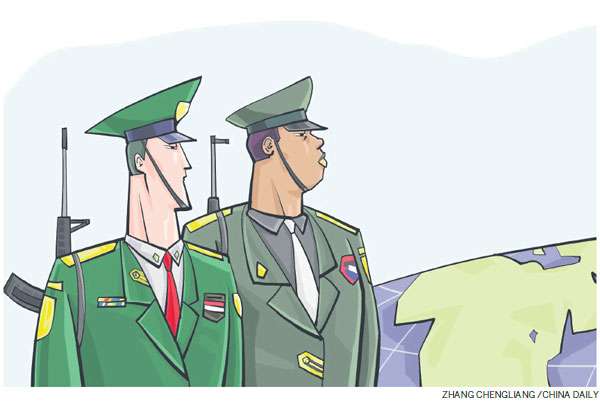China helps to shore up maritime security

Cooperative efforts on Horn of Africa trade route are contributing to global peace
While economic ties between Africa and China are well documented and have grown at a faster rate than most other partnerships, influential think tanks from Africa and China are of the view that this strong economic cooperation should now be replicated in the security sector, to ensure that China and Africa actively contribute to global peace and stability. This is according to a Southern Africa News Features article under the headline "A call for closer security cooperation between China and Africa".
This view was echoed during the China-Africa NGOs and Think Tank Leaders Conference in Beijing, which took place in September. At the opening ceremony, An Yuejun, the secretary-general of the Chinese People's Association for Peace and Disarmament, said China and Africa should explore innovative ways of resolving security issues on the continent. "We need a new mentality of peace," he said, adding that there is a need to "move away from our old ways of resolving crime".

Participants at the conference urged Africa and China to continue working together on strengthening security cooperation through skills development, financial assistance and technological transfer, among others. In addition, the think tanks agreed that there is a need for China and Africa to introduce a monitoring and evaluation mechanism to track the implementation of adopted peace and security mechanisms in order to identify successes and challenges.
The conference focused on three topics of interest to both China and Africa. These are the characteristics of the world security situation, the African security situation and China-Africa security cooperation, as well as social organization cooperation between Africa and China. The conference, among other things, discussed various security mechanisms that could be adopted to address new and emerging security challenges, and was attended by scholars and researchers from Ethiopia, Namibia, Tanzania, Zambia and Zimbabwe. Also participating were representatives from nongovernment organizations in the BRICS member states (Brazil, Russia, India, China and South Africa).
Security cooperation between China and Africa was first presented in the Forum on China-Africa Cooperation's Addis Ababa Action Plan (2004-06), which was adopted by foreign ministers from China and Africa in Ethiopia in 2003, as well as in the FOCAC Johannesburg Action Plan (2016-18) agreed upon at the FOCAC Summit in Johannesburg, South Africa. At that meeting, China pledged to work with Africa through the African Union and other subregional organizations in preventing, mediating and resolving conflicts; to continue its active participation in peacekeeping operations and the mine removal process in Africa; and to provide financial and material assistance as well as training to the AU Peace and Security Council. Furthermore, China agreed to strengthen the capacity of African countries and subregional organizations to undertake peacekeeping operations.

As a followup to these engagements on China-Africa security cooperation, the Shanghai Institutes for International Studies, the Intergovernmental Authority on Development, whose membership comprises several African nations, the African Policy Institute, the Institute of Diplomacy and International Studies-University of Nairobi, and The Carter Center in the United States jointly held a conference on peace and security cooperation in Shanghai from March 31 to April 1.
The peace and security issue has been emerging as one of the key factors in the China-Africa relationship, especially after it was initiated as one of the 10 cooperation plans at the Forum of China-Africa Cooperation Johannesburg Summit in December 2015.
As the architect of the main African solutions, the Intergovernmental Authority on Development has been cooperating closely with China on issues such as the security situation in the Horn of Africa, China-IGAD relations, IGAD's experience in conflict mediation, anti-terrorism, anti-piracy and rapid response, suggestions for China-IGAD cooperation in peace and security, South Sudan mediation and anti-terrorism in Somalia.
One of the areas of particular concern has been maritime security in the Horn of Africa.
The Greater Horn of Africa, as defined by IGAD, comprises eight countries: Djibouti, Eritrea, Ethiopia, Sudan, South Sudan, Kenya, Uganda and Somalia. The Horn of Africa coastline is the key entry point to the East Africa region, North Africa and the greater sub-Saharan Africa. With nearly 7,000 kilometers of coastline, this area has become a focal point for maritime security concerns, especially because it is viewed a hot spot for piracy.
China's involvement in maritime security in this region is informed by the fact that, as a gateway for Chinese goods to the rest of Africa and a southern bridgehead to the Mediterranean Sea and Europe, a disruption in the security apparatus in this area has the potential to seriously disrupt rolling out the 21st Century Maritime Silk Road component of the Belt and Road Initiative.
These maritime security concerns were doubtless a key consideration in the decision to set up China's new naval logistics base in Djibouti, joining other international powers such as the United States, France and Japan that already have bases in this small but stable African country. Djibouti occupies a strategic location adjacent to the Bab el-Mandeb Strait, a crucial corridor for international shipping.
The key maritime security threats in the Horn of Africa take three main forms. The first and most common is piracy by high speed skiffs, mostly off the Somali coast. The second threat is in the form of conflict-related violence, or attacks on vessels near the Horn of Africa with incidents that suggest that both sides of the Yemeni conflict may be looking to disrupt maritime support. The third threat is maritime terrorism or possible terrorist threats to commercial vessels resulting from ongoing terrorist activities in the region.
Most of these factors are related but not limited to piracy and include geographies of state failure in a region that has been plagued by unstable governments and conflict.
There is also weak law enforcement, as maritime insecurity is not viewed as threatening to the local stability, legal formation and mechanisms. The breakdown in apprehension, prosecution and incarceration has naturally led to an enabling environment for criminal activities that thrive due to their nonthreatening nature to the local community. The realities of economic dislocation also mean that piracy is not viewed as a criminal activity, but rather as subsistence entrepreneurship, and therefore an acceptable form of revenue generation. Finally, there is moralization of piracy and cultural acceptability whereby key actors have traditionally been viewed as protectors of the coastline against environmental degradation.
According to Daoud Alwan of IGAD, the potential impacts of the organization's maritime strategy include better international capacity building, coordination and cooperation in handling of anti-piracy activities. Through its Security Sector Program, IGAD member states have a wide range of instruments, regionally as well as internationally, that they can, and should, implement to enhance cooperation and diplomacy to prevent and counter terrorism and violent extremism.
Ultimately, the cost of not dealing with maritime security in the Horn of Africa is too high to ignore in terms of increased insurance premiums; loss of life; decreased free movement of goods; and the potential of increased conflict-related spillovers, among many other effects. Besides, there can be no development without stability, and maritime security plays a central role in stabilizing the Sino-Africa trade route and development of further cooperation.
The author is director of the center for Strategy and Policy Management Africa Policy Institute, Nairobi, Kenya. The article is extracted from a paper the author presented this year at the China-IGAD Peace and Security Cooperation in the Horn of Africa. The views do not necessarily reflect those of China Daily.
(China Daily Africa Weekly 11/24/2017 page12)
Today's Top News
- Beijing warns countries against signing trade deals with US that hurt Chinese interests
- AI shouldn't undermine humanity's progress
- Xi urges villagers in Xizang to uphold ethnic solidarity
- Digital tax sparks breakdown in US-Canada trade talks
- Expert debunks Lai's 'four elements' argument for Taiwan's so-called statehood
- China opposes any tariff deal made at its expense: commerce ministry






























